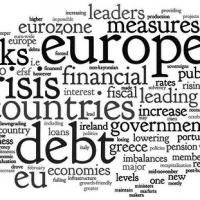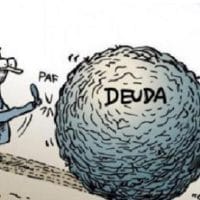-
From the BRICS countries to the townships: racial and social segregation continues
Over 25 years ago now the people of South Africa won the struggle to end the Apartheid regime. Nevertheless, even though it is now against the law, de facto racial segregation is still apparent.
-
The mountain of corporate debt will be the seed of the next financial crisis
What have they done with the money? Have they invested in research and development, in production, in the ecological transition, in creating descent jobs, warding off climate change? Not at all!
-
The challenges for the European left regarding debt and the banks
The policy of Quantitative Easing (QE) has been implemented by the ECB since 2015 in the wake of what the Fed had done in the U.S. from 2008 to 2014. It consists of massively purchasing private and public debt securities from banks in the Eurozone and from corporations.
-
Adam Smith and the Yellow Vest Movement
It is sad to see how completely misrepresented Adam Smith (1723-1790) is when pundits call upon him to vindicate neoliberalism and the status quo. It seems many have not really bothered to read his works.
-
Facing the left-wing challenge in the European Union
One of the central and most concrete themes that the break should cover concerns the way public indebtedness is used to justify austerity policies.
-
The challenges for the Left in Europe and the Eurozone
The policies dictated by the European leaders have six fundamental objectives; Bail-out the private banks with public funds, preserve the Eurozone perimeter, bring neoliberal policies to bear more heavily on Greece, reinforce a Europe-wide authoritarian form of governance and more.
-
We struggle against illegitimate public and private debt which are at the core of the capitalist system
What we are fighting is a capitalist system that destroys nature.
-
Russian debt repudiation, 100 years on
One achievement of the Russian revolution that is often ignored is the fulfillment of a promise made by the Russian revolutionaries in 1905: that all debts contracted by the Tsarist regime that had been overthrown some eleven months earlier were cancelled.
-
The Odious Iraqi Debt
This article, originally written towards the end of 2003, is now published on our website for the first time in English. The odious Iraqi debt is still under-documented today, though it is highly relevant in our research and our proposals against all illegitimate, illegal, odious and unsustainable debts. It is a rare case where a […]
-
Latin America: 200 years of the infernal cycle of debt
Venezuela is an emblematic case of the infernal cycle that Latin America has been struggling with over the last two centuries. It all began in 1810, when Simon Bolivar, a figurehead of the Spanish colonies in their fight for freedom, began borrowing from London in very unfavourable conditions to finance the wars of independence.
-
Yanis Varoufakis’s self-incriminating account of the Greek Crisis (Part 3)
[box type=”note” style=”rounded”]Part 1: Proposals Doomed to Fail Part 2: Varoufakis’s questionable account of the origins of the Greek crisis and his surprising relations with the political class Part 3: How Tsípras, with Varoufakis’s aid, turned his back on Syriza’s platform [/box] Yanis Varoufakis traces his collaboration with Alexis Tsípras and his alter ego, Nikos […]
-
Yanis Varoufakis’s self-incriminating account of the Greek Crisis (Part 2)
[box type=”note” style=”rounded”] Part 1: Proposals Doomed to Fail Part 2: Varoufakis’s questionable account of the origins of the Greek crisis and his surprising relations with the political class Part 3: How Tsípras, with Varoufakis’s aid, turned his back on Syriza’s platform [/box] In his latest book Adults in the Room, Yanis Varoufakis gives us […]
-
Yanis Varoufakis’s self-incriminating account of the Greek Crisis (Part 1)
Yanis Varoufakis’s entire proposal regarding debt was and is unacceptable from a left-wing point of view because it presupposes evacuating any debate as to the legality and legitimacy of the debts whose repayment is being demanded of Greece.
-
People must self-organize and keep up the pressure on their governments if we are to bring about radical change
There is still an opportunity to get out of the crisis situation and bring about social justice and structural changes that would favour the majority of the population. However if the radical majorities do not seize that opportunity, be sure that the far right will.
-
Will Capitalism Absorb the WSF?
From 21 January to 2 February 2010, Eric Toussaint and Olivier Bonfond — both involved in alterglobalization activism and members of the International Council of the World Social Forum, of the world coordination of social movements, and of the Committee for the Abolition of the Third World Debt 1 — participated in various events and […]
-
Developing Countries: Dangerous Times for the Internal Public Debt
Since the second half of the 1990s, the internal public debt of the world’s developing countries has increased significantly. This increase is now reaching alarming proportions in a number of middle-income countries. While some very poor countries have not yet been affected, the historical trend indicates a continuing rise in the debt level for developing […]
-
Third World: Is Another Debt Crisis in the Offing?
While taking a significant toll on public revenues,1 repayment of the public debt has, since 2004, ceased to be a major concern for most middle-revenue countries and for raw material-exporting countries in general. In fact the majority of governments of these countries are having no trouble finding loans at historically low interest rates. However, the […]
-
The Triple Failing of the Big Private Banks
Since August 2007, US and European banks have constantly made headline news concerning the deep crisis they are going through and its knock-on effect on the neoliberal economic system as a whole. Asset depreciation for these banks currently stands at over 200 billion dollars. Several banking research services and seasoned economists estimate that the final […]














